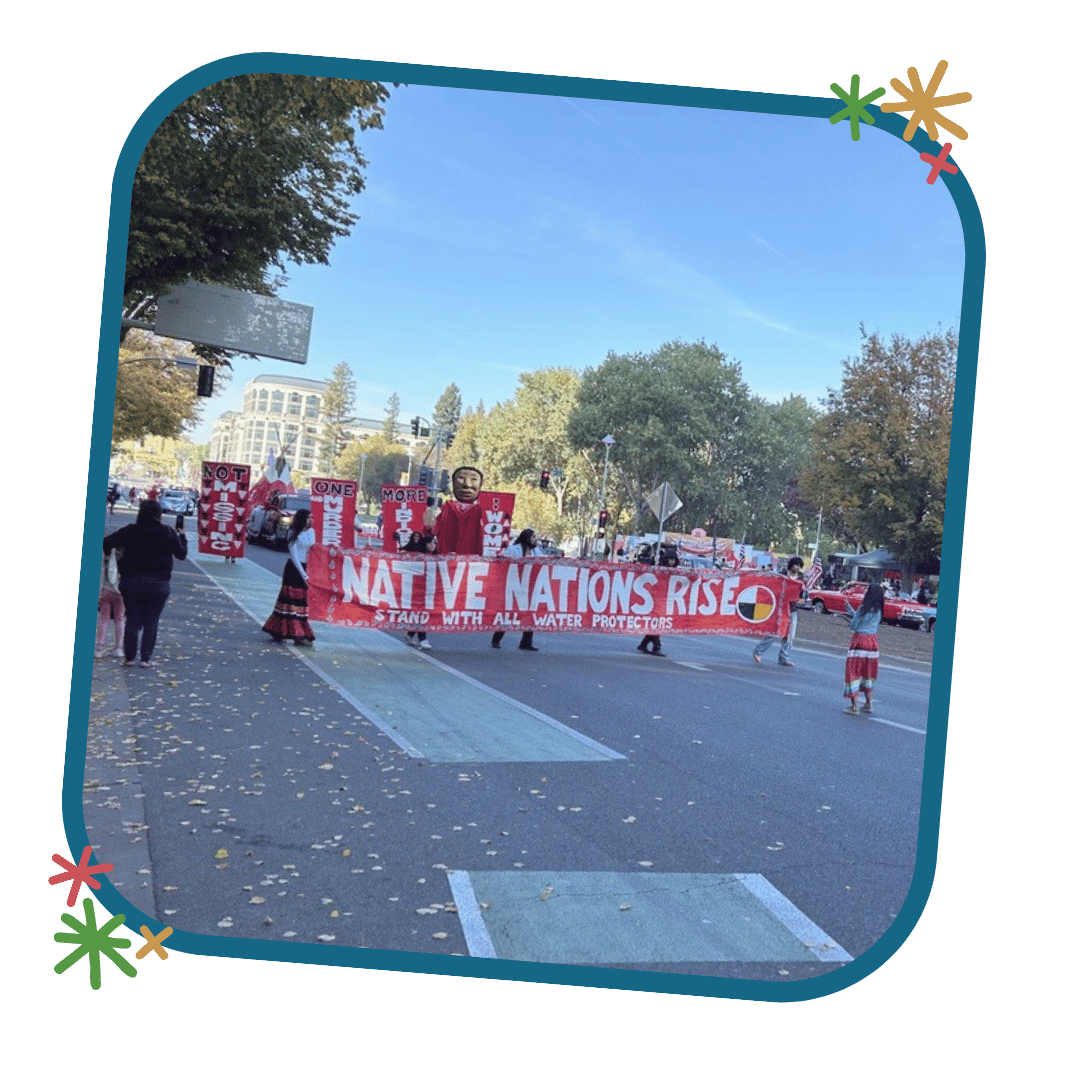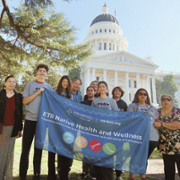California's Inaugural Native American Heritage Month Parade: A Celebration of Community
By Ravena Soto | November 19, 2024
Staff from ETR’s Native Health and Wellness team had the honor of attending the first Native American Heritage Month parade outside of the California State Capitol. For this historic event, we were joined by our partners from United Indian Health Services and Redwood Valley Rancheria.
The parade, hosted by the California Legislative Native American Caucus, came together with a sense of mission after months of planning and many miles of travel.
This was not just another community event on the calendar, but an opportunity to uplift and reinvigorate us. It highlighted the importance of coming together as a community to celebrate our identity, while contributing to a powerful sense of unity and building a strong network of support.
Youth led our group through the procession by carrying our banner and handing out goodies and flyers to attendees. Our elders waved and brought up the rear from our vehicles while proudly watching over our team.
Centering Joy and Belonging
Unlike some public events, this was not about performing for others or educating those unfamiliar with our communities. Instead, it was a celebration designed by us, for us. The time and space were dedicated to joy and belonging. Native Californians often work within our local communities or in smaller circles, and because our tribes are diverse and numerous, we do not often come together on such a large scale.
However, this day brought people together from many different communities, organizations, and professional backgrounds. We saw familiar faces, formed new friendships, and reconnected with some we had not seen in years.  We learned what others are doing in their communities, exchanged information, and discussed ways to support each other moving forward. It was a profound moment of visibility.
We learned what others are doing in their communities, exchanged information, and discussed ways to support each other moving forward. It was a profound moment of visibility.
The parade was a powerful mix of celebration and remembrance. We honored those who are no longer with us and acknowledged the critical issues that affect our communities, from the tragedy of Missing and Murdered Indigenous People to the struggles with addiction and overdose. But overarching everything was a deep celebration of culture, resilience, and strength.
This experience made our work feel even more meaningful. Especially when working to improve the health and well-being of Native individuals and communities, progress can feel slow and setbacks overwhelming. Yet, standing together at this event was a reminder of how far we have come.
A Celebration of Progress
 Just a generation or two ago, the idea of a Native American Heritage Month parade marching along the streets of the California State Capitol would have seemed unimaginable.
Just a generation or two ago, the idea of a Native American Heritage Month parade marching along the streets of the California State Capitol would have seemed unimaginable.
To openly celebrate who we are feels unfamiliar, but it fills me with a sense of hope and an acknowledgement of just how much has changed in my own lifetime.
This parade was a powerful step forward. We will continue to honor our heritage, celebrate our people, and invest in our future. I am eager for more opportunities like this, to celebrate in community, and to affirm that our efforts and the efforts of those before us have not been in vain.
Our Native Health and Wellness Work
ETR will continue to build trust with Native communities to address health disparities, amplify Indigenous voices, and honor community voice by partnering with Native communities to ensure we center community-driven best practices. Learn more about our work with Native communities:
- Tribal Community Coordinating Center (TCCC) is a project of ETR, funded by the California Department of Public Health (CDPH), with the primary purpose to inform local and state partners, stakeholders, and policy leaders about key tobacco-related policy, system, and environmental changes that have been prioritized by Tribes.
- TCCC uses the Health Equity Framework of Change—ETR’s Health Equity Framework (HEF) integrated into their work with Tribal sovereignty, relationships, and traditions in mind—for their culturally appropriate policy platform.
- Respecting the Circle of Life: Mind, Body & Spirit is an educational program that gives Native American young people the knowledge and skills they need to protect themselves from unplanned pregnancy and sexually transmitted diseases (STDs). The Johns Hopkins Center for American Indian Health worked with Native American community members to adapt the program for use with Native youth and families to include a focus on unintended pregnancy in addition to STD/HIV.
Ravena Soto (she/her/hers) is the Program Manager I for ETR’s Tribal Community Coordinating Center. She is from northern California and a member of the Enterprise Rancheria Maidu Tribe. Ravena lives in the Los Angeles area and works to support California Tribal communities and Tribal-serving organizations in pursuit of more positive health outcomes.




